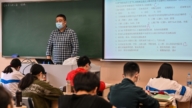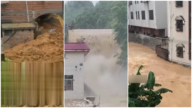【新唐人2011年8月23日讯】大陆最高法院近日出台了一个新规定,对于所谓“信息不公开”的政府机关,公民、法人或者其他组织可以依法提起诉讼。专家指出,最高院的这个规定,实质上是中共当局在巨大的民怨压力之下,用来糊弄老百姓的一个“维稳”手段。当局不想、不敢、也不可能真的对老百姓实行“信息公开”。
大陆最高法院颁布的这个《关于审理政府信息公开行政案件若干问题的规定》,共有13项条款,《规定》指出,法院应该受理5类与政府“信息公开”相关的行政案件,包括:行政机关拒绝提供相关信息、或者逾期不予答复、信息不正确等。
最高法院的这个新《规定》,是对当局3年前实施的《政府信息公开条例》的进一步解释。
对此,山东维权律师舒向新对《新唐人》表示,因为司法不独立,最高法院的这个《规定》很难落实。
舒向新:“关键是,现在政府和官员不守法,不是个别问题了,是个普遍问题。并不是全国某一个区县信息不公开,全国各地都不公开,这样的话,法院它能审得了吗?”
近年来,从SARS事件、汶川大地震、三聚氰胺毒奶粉案、杨佳杀警案、直到最近的温州特大动车追尾案,每一件事情都迷雾重重,老百姓很难得知那些被官方隐瞒的真相,甚至很多找寻真相的人被当局抓捕。比如,揭示法轮功学员被迫害真相的著名维权律师高智晟被当局抓捕判刑,迄今仍然“被失踪”。
但随着民众的不断抗争和网络媒体的普及,中共越来越被动。 《德国之声》援引美国《时代周报》的报导指出,大量的丑闻使民众认识到,“只要生活朝上走,我们就信任党。”是不可靠的说法。从动车追尾事故可以看出,老百姓不再相信当局媒体,人们通过互联网和微博表达不满,人民与统治者之间的力量对比正在发生变化。
江西新余下岗女工刘萍,曾经在微博围观力量的帮助下,出来独立参选人大代表,对此,她深有感触。
独立参选人刘萍:“微博的力量是非常大的,尤其是我被非法拘禁的时候,全国这么多民众,尤其是李悔之老师、于建嵘老师等等一些知名人士为我呼吁,否则的话,我估计,我不可能出来。”
在动车惨案中,甚至,前所未有的有数百家媒体抵制当局的禁令,批评政府处理不当、试图掩盖真相。
面对来自公众与媒体的巨大压力,中共当局开始高唱“信息公开”、“政务公开”,希望借此安抚民众、让老百姓相信当局并没有掩盖真相。
普林斯顿大学中国问题学者程晓农在接受《美国之音》采访时表示,从最近发生的两件大事就可以看出,中共政府其实是在糊弄老百姓。
一件是温州动车事故,到现在为止,当局也没有计划公布真相、甚至连死者名单都成了谜﹔第二件是大连数万民众抗议PX化工厂项目,当地政府把老百姓骗回家,同时对媒体和互联网实行严密管制。
网络时评人士“仁文主意”发表文章:“国人还要被政府信息公开继续忽悠多久”指出,这个《规定》甚至都没有提到:对拒绝受理的法院,如何进行法律制裁。这个“规定”只是又一个“忽悠”。
新唐人记者李岚、李谦、柏妮采访报导。
=====
China’s Information Disclosure Scam
The China’s Supreme Court recently enacted a new law
empowering individuals and organizations to sue
any authoritative department that fails to properly disclose
certain information.
To experts, policies like this only serve to appease the public
who have grown discontent over the lack of transparency
of the Chinese Communist Party (CCP), as the authorities
will never disclose what they do not want to disclose.
Out of the 13 articles in the newly released Stipulations
Regarding Authoritative Information Disclosure,
there are five that relate to administrative disclosure
procedures, which the state courts have to follow.
The law would apply, for example, where executives refuse
to provide relative information to subordinates or refuse to
give an adequate explanation, or give wrong answers.
This new law is a further interpretation of the
Disclosure of Government Information Regulations
which was published three years ago.
Human rights lawyer, Shu Xiangxin, from Shandong Province,
told a NTD that this regulation is less likely to be implemented,
as there is no independent judiciary.
Shu Xiangxin: “The core problem lies in the law-violence
of the CCP officials and governments
—not in particular, but in general.
The whole country violates this new disclosure law,
so how can the courts deal with all of that?”
From the SARS incident to the Sichuan earthquake,
the melamine contaminated milk powder case,
Yang Jia kills policemen case, to the most recent
Wenzhou high-speed train crash case,
all of these cases are rife with dubious evidence
and as a result, ended up unsolved.
Anyone who endeavored to uncover the truth, was silenced.
Also, the whereabouts of rights lawyer, Gao Zhisheng,
who defended Falun Dafa practitioners remains unknown.
The CCP however, is trying to contain the public’s outcry
over its bad politics, while trying to control the Internet.
The U.S.-based Times was quoted by the German media
Deutsche Welle, as saying that massive scandals
have made the public aware of the fact that the old saying
“Follow the Party, better your life,” is simply not true.
The high-speed train accident has shown that the public
is quickly losing trust in the CCP authorities.
As more and more people express their discontentment,
via the Internet, changes are taking place along the way.
Ms. Liu Ping from Jiangxi, who was laid-off from her job,
ran for the Deputy to the People’s Congress position.
She found needed support for her election from micro-blog.
She said that she has a lot of personal experience
with the public’s growing distrust of the CCP authorities.
Liu Ping: “Micro-blog is so powerful!
During the time that I was illegally detained, people across
the country spoke out for me,
especially renowned individuals such as Mr. Li Huizhi
and Yu Jianrong, etc.
Without their voices, I would have never been released.”
Also, regarding the high-speed train crash, hundreds of media
strongly resisted the CCP’s ban on criticizing the regime
for their intentional cover-up and their refusal
to properly deal with the incident.
Responding to public pressure aimed against the media,
the CCP has pinned its hopes on this high-profile declaration
of information and administration disclose, in an effort to
convince the public that they didn’t hide the truth.
Cheng Xiaonong, a Princeton University scholar told NTD,
“Judging from the two recent cases, it is so obvious that
the CCP authorities are trying to fool people.”
One incident involves the high-speed train crash.
The authorities in this case have no intention of announcing
the real cause of the accident or an accurate body count.
Another incident involves thee Dalian protest against the
Chemical Factory PX project where tens of thousands of
protestors were persuaded by the authorities to go back home
while the authorities ordered a complete media
and Internet blackout of the event.
Internet critic, Renwen Zhuyi, said in an article:
“How long will the public be fooled
by this so-called information disclosure?
Also, there is no mention about what consequences the courts
will have to face if they violate this law.
Basically, this is a new version of lies created just for this law.”
NTD reporters Li Lan, Li Qian and Bo Ni





























